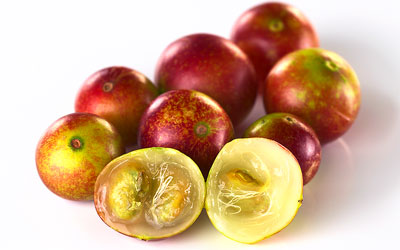First used by the indigenous peoples of the Amazonian region, camu camu is quickly getting worldwide popular as the best known source of vitamin C (ascorbic acid), providing a whopping 96 mg per 4 g, which surpasses by about 30 times the amount of ascorbic acid in oranges and slightly exceeds the Recommended Dietary Allowance (RDA) of 90 mg/day for adult men and 75 mg/day for adult women.1 Additionally, camu camu stores fair amounts of lutein (which supports eye health) and manganese (crucial for healthy bones). However, a recent clinical trial suggests that camu camu may also have a beneficial effect on cardiovascular health as well.
The Study
The study was conducted in the Tokyo University of Agriculture, and the results were published online in the journal Data in Brief (December 2017), describing the variations in vasodilation and blood pressure changes in 20 healthy young adults (10 female and 10 male, 18-28 years old), after being randomly administered a single dose of three soft gelatin capsules, each one containing either 25 mg of freeze-dried camu camu powder or water as a placebo. The only food restriction during the study was the consumption of cereal. A second dose, with the same characteristics, was administered over a week later, and the resulting data was analyzed.
The Results
Changes in arterial diameter, as well as in blood pressure, where recorded between 20 and 110 seconds after the administration of the camu camu extract or the placebo. After more than two weeks, evidence of variation in vasodilation due to camu camu extract was negative, with even slightly positive responses in the placebo group.
On the other hand, a general decrease in systolic and diastolic pressure was notable among the participants who were given the camu camu extract, particularly in the male group, where a reduction was registered in eight of the ten individuals, with few discrepancies between systolic and diastolic pressure. The female group, however, respond positively to the camu camu extract only in four of the ten participants, with lower blood pressure rates in general, as well as discrepancies between systolic and diastolic pressure.
What Does This Mean?
Camu camu has been revealed, once again, as a functional food with promising applications in different areas of health care.2 Although these results were modest, taking into account the size of the sample and the length of the study, the potential hypotensive effects of the Amazonian cherry are worth to consider; however, further studies will be of help in order to establish the relevance of camu camu for cardiovascular health.
Other beneficial herbs for cardiovascular health are arracacha, kaniwa, lucuma, and passion fruit.
Sources
- Data in Brief, Data on a single oral dose of camu camu (Myrciaria dubia) pericarp extract on flow-mediated vasodilation and blood pressure in young adult humans, 2017
Footnotes
- National Institutes of Health (NIH). Vitamin C. Retrieved May 5, 2023, from: https://ods.od.nih.gov/factsheets/VitaminC-Consumer/
- Journal of Alternative and Complementary Medicine. (2015). Antioxidant and Associated Capabilities of Camu Camu (Myrciaria dubia): Systematic Review. Retrieved May 5, 2023, from: https://www.ncbi.nlm.nih.gov/pmc/articles/PMC4296744/







